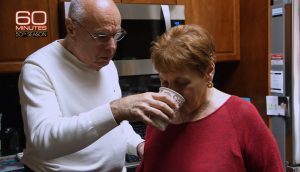60 Minutes Special: Life of an Alzheimer’s Caregiver
In a recently aired segment on CBS’ 60 Minutes, Chief Medical Correspondent Dr. Jon LaPook shared an update on Carol and Mike Daly, a couple he has followed for the last decade as Alzheimer’s slowly took Carol away, leaving her husband physically and emotionally shattered in its wake.
Schekesia Meadough, BSN, RN, CDP, and Vice President of Health and Wellness for Autumn Leaves, gives us an overview and shares her thoughts on this unprecedented and intensely private look into the life of a family caregiver:
“The 60 Minutes story shows the devastating health consequences for Carol Daly and her husband Mike, who have endured the struggles of Alzheimer’s for 10 years. The Daly’s story covers the classic stages of dementia beginning in 2008. Carol’s family had previously poked fun at her for forgetting things, but it soon became apparent that her forgetfulness was more than simply aging.
In the beginning, Carol exhibited signs of mild cognitive decline and experienced some short-term memory loss. But she was still able to feed herself and handle her own daily personal care, such as showering and dressing. As we follow her over the course of the last decade, Carol’s cognitive decline becomes increasingly severe, to the point of what we call ‘late-stage Alzheimer’s disease.’ Requiring round-the-clock assistance with activities of daily living (ADLs), from eating, dressing, and grooming to bathing and toiling, Mike attempted to take the task on by himself. He took seriously his wedding vow, ‘For better or worse.’
The disease changed Mike, too, throughout the years. When we first met him 10 years prior, he said, ‘I can handle this. I’m not putting her in a nursing home.’ As the years pass and her dementia progresses, we see the toll it takes on Mike. He develops anxiety, hypertension, weight gain, and considers suicide. Knowing he could no longer do it alone, Mike finally hires a home health worker to help, but with his own mental and physical health continuing to decline, he ultimately makes the decision to move Carol to full-time care.
One of the takeaways from this segment is that families need to recognize the stress of being a caregiver. An important step is to prepare now so you know when it is the right time to place your loved one in a memory care community.
The decision to move to full-time care outside of the family home is, of course, different for every individual and every caregiver. My advice: There is no downside to placing a loved one ‘too early’ in the disease process, but there are numerous downsides if placement is prolonged.
Levels of care are an important aspect of placement, and can actually improve quality of life for the patient and the family. Medication management, assistance with mobility, assistance with wandering to prevent elopement, and other direct care tasks are available 24/7 — something no family member can shoulder alone.
Another benefit of memory care is the availability of practical and clinical expertise. Medications are carefully regulated and administered on a consistent schedule. Staff is trained to look for indications that a resident’s medication regimen needs changing. Nursing staff will coordinate with a physician to ensure changes are made.
Mobility assistance is also very important to consider. In a community like Autumn Leaves, our staff is trained to properly assist with transfers and mobility. They have the tools and adequate staff to do so properly. Trying to transfer an adult without this training is dangerous both for the caregiver and the patient.
Wandering is another concern for those living with dementia. Placement in a secured memory care community decreases the chances of elopement. For example, our secured indoor and outdoor areas and supervised outings help tremendously with wandering and give our residents a sense of freedom.
Stress can easily take a toll on family caregivers of any age. Family members must consider their own emotional and physical limitations while providing care and be honest when they can no longer fully handle the responsibility. Full-time memory care can be good for both the caregiver and the loved one’s overall health and well-being.”
For more information on how we can help ease your caregiving burden, please call us today at 888-662-8886. From day stay* and respite to full-time memory care, we have a caregiving solution that will fit your and your loved one’s needs.



